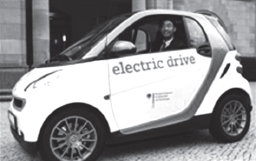UEFS 2011/2
TEXTO:
Germany to invest in more electric cars

The German government has approved more money
to help companies that build electric cars. There are
only around 2,500 electric vehicles registered on German
roads at present. The plan is to increase this figure to a
5 million by 2020.
Germany plans to double financial aid, particularly
to develop better, lighter batteries, which remain the brake
on the technology’s mass appeal. Cars which emit
virtually no carbon dioxide will be exempt from tax.
10 Despite its green reputation, Germany has been slower
than other countries, like Japan, to develop electric cars.
It now aims to change this, but attitudes may be hard to
change. It is a country where ‘no speed limits on the
motorway’ is seen as sacrosanct.
15 And it is the country of the BMW (car), though the
luxury car-maker is now trying to develop lighter materials
to make its vehicles greener.
EVANS, Stephen. Disponível em: . Acesso em: 2 jun. 2011.
Considering language use in the text, it’s correct to say:
The verb form “has approved” (l. 1) describes an action disconnected from the present time.
The relative pronoun “which” (l. 8) can be correctly replaced by that.
The possessive pronoun “its” (l. 10) refers to “Japan” (l. 11).
The word “like” (l. 11) is functioning as a verb.
The modal “may” (l. 12) expresses necessity.
E mais: nota TRI a todo o momento.





